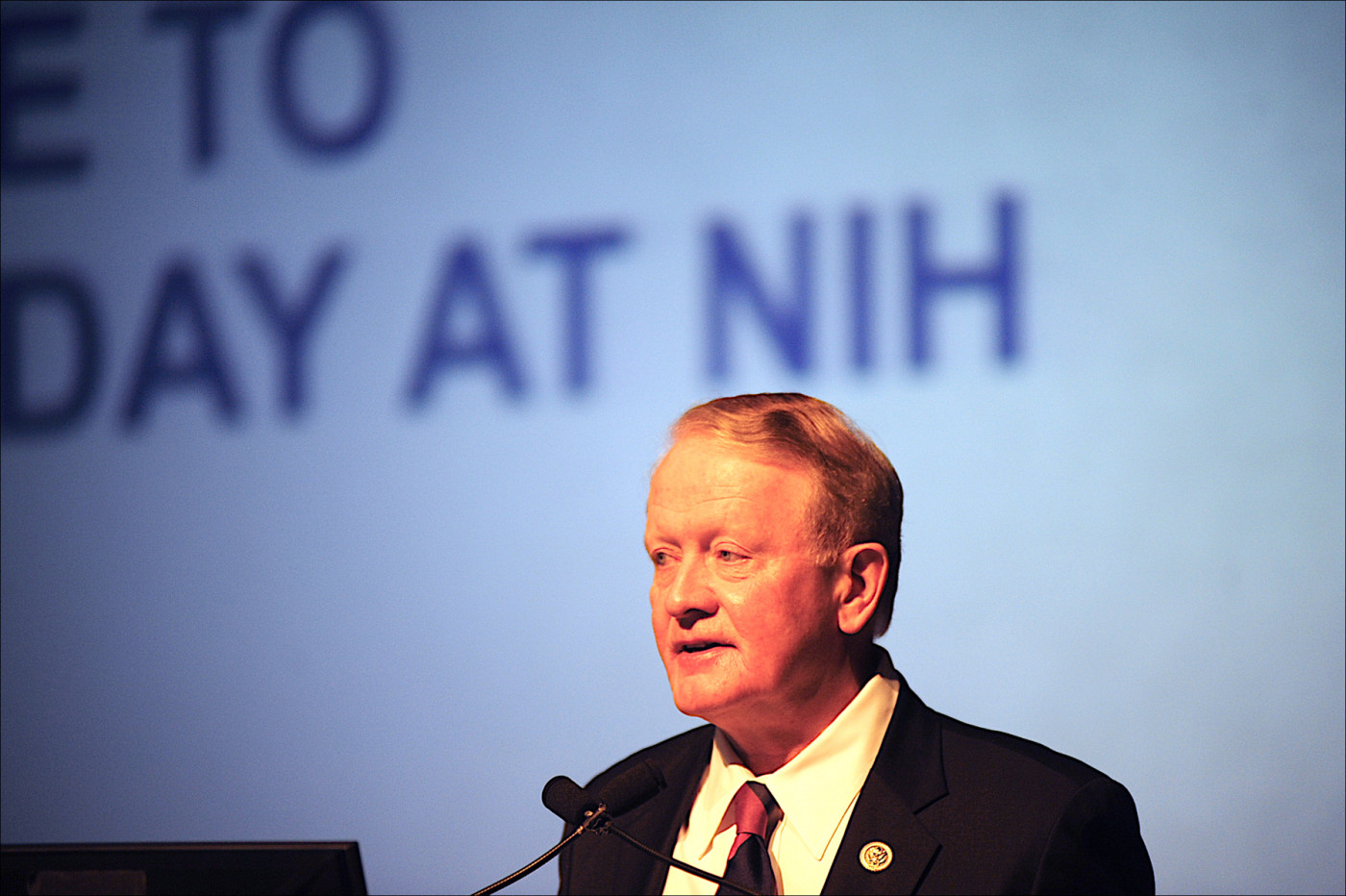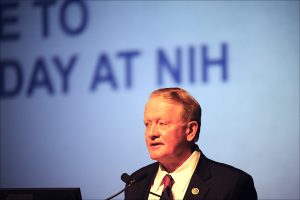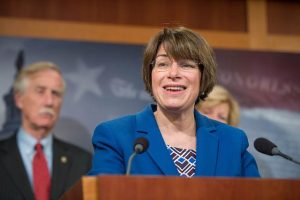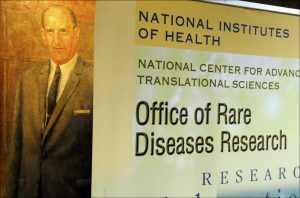US Lawmakers Urge Bipartisan Support for Rare Disease Research, Patients’ Needs
Written by |

Rep. Leo Lance (R-NJ) speaks at NIH in Bethesda, Md. (Photo by Larry Luxner)
At a time of unprecedented polarization in Congress, two U.S. lawmakers — one Republican, one Democrat — are stressing the urgency of working across the aisle to help the estimated 30 million Americans with rare diseases.
Rep. Leonard Lance (R-New Jersey) and Sen. Amy Klobuchar (D-Minnesota) spoke to more than 600 people attending Rare Disease Day at the National Institutes of Health (NIH) in Bethesda, Maryland.
Lance and Klobuchar, along with retiring Sen. Orrin Hatch (R-Utah) and Rep. G.K. Butterfield (D-North Carolina), co-chair the Rare Disease Congressional Caucus, which comprises 11 senators and 126 representatives.
“For the NIH to be our partner in the fight against rare diseases, it needs resources to hire experts, conduct clinical trials and shepherd research,” Lance said at the March 1 event. “Just last month, Congress again put action behind its words. In the bipartisan budget agreement, the NIH saw a funding boost of $2 billion to support additional scientific research.”
In raising the agency’s annual budget to $36.1 billion, Congress sidestepped a White House proposal to slash NIH spending by 17 percent. Lance, noting this “is an indication of our priorities,” praised President Trump for supporting medical innovation, urging the approval of new therapies, and demanding lower prescription drug prices in his Jan. 30 State of the Union speech.
“Having observed State of the Union speeches over the course of a decade, even a prepositional clause — let alone a sentence or paragraph — is a very important factor,” Lance said. “These are speeches where each word should have a positive impact on the nation.”
Klobuchar urges House passage of Benefit Act
Lance thanked attendees for coming to Washington, noting that if not for such patient advocates, “the cause of rare disease might not be at the centerpiece of our national dialogue.”
“When visiting members of Congress, please ask them to join our effort. I want to be the chair of the largest caucus in the House of Representatives,” said the lawmaker, who represents New Jersey’s 7th Congressional District. “Ask them to vote with us regarding funding.
“There is definitely strength in numbers, and this is how the process is supposed to work — Democrats, Republicans and independents working to improve the health of the American nation,” Lance added. “And it’s not just the American people who are counting on us, but patients around the globe.”
Klobuchar, addressing the NIH event by videoconference, said rare disease patients often find themselves on an “emotional roller-coaster” when it comes to new therapy approval by the U.S. Food and Drug Administration (FDA).
“These patients need greater clarity about the process for approving these drugs. Passing the 21st Century Cures Act was an important milestone. But today, there is no requirement that the FDA include patient experience as part of its risk-benefit framework,” she said.
“That’s why Sen. Roger Wicker (R-Mississippi) and I last year introduced the Benefit Act” — an acronym for Better Empowerment Now to Enhance Framework and Improve Treatments,” she added.
The legislation, which strengthens patient participation and the “patient experience” in drug development, has been endorsed by a wide range of advocacy groups, including the National Organization for Rare Disorders (NORD), the Muscular Dystrophy Association, and Parent Project Muscular Dystrophy.
Passed by the Senate in 2017, the Benefit Act now awaits a House vote and Klobuchar urged her colleagues to approve it.
“We also need to ensure that treatments for rare conditions are accessible and affordable, because when costs get too high, patients can’t get the medications they need. I am committed to make sure medical research isn’t undermined in this year’s budget,” she added.
Klobuchar, the first elected female U.S. senator in Minnesota history, said she was the only senator to donate her salary to the NIH Foundation during the lengthy 2016 federal government shutdown, “when patients were going without treatment and research was interrupted.”
Lance voices support for ‘Right to Try’
Following the NIH event, Lance told Bionews Services in an interview that the Orphan Drug Tax Credit — which Congress slashed nearly in half late last year —may need to be revisited. In November, the House voted 227-205 to repeal it entirely, but the Senate ended up lowering the value of those incentives from 50 percent of qualified clinical testing expenses to 27.5 percent.
NORD, which lobbied hard to preserve it, claims that the credit — which also gives drug companies seven years of exclusivity to market approved therapies — has led to the approval of 451 orphan drugs for 590 rare disease indications since its passage in 1983.
“We might want to extend that period of exclusivity. That would give drug companies a greater opportunity to bring new medicines to market,” Lance said. “Patients and families come into my office virtually every week crying out for medicines for rare diseases. The situation should be improved because there are so many unmet needs.”
Lance also weighed in on the ongoing “Right to Try” controversy. In August 2017, the Senate passed a bill that would allow terminally ill patients access to therapies under study but not yet approved by the FDA. A companion bill, H.R. 878 or the Right to Try Act of 2017, is now before the House Energy & Commerce Committee.
So far, 38 states have passed their own Right to Try laws, giving patients access to drugs outside of clinical trials as long as such medications have undergone preliminary safety testing. New Jersey — home to 14 of the world’s 20 largest pharmaceutical companies, including Novartis, Johnson & Johnson, Merck, Bristol-Myers Squibb and Bayer Healthcare — is among 12 states considering such a law.
“Speaking for myself, I do favor the right to try. And of course, various federal agencies including the FDA are not necessarily of the same opinion,” Lance said. “I was pleased that the president mentioned it in his State of the Union. But this should be governed by uniform standards across the country.”
NORD, like the FDA, opposes the Right to Try. In a Feb. 6 letter to lawmakers, the Connecticut-based organization said the bill now under consideration “may possibly harm patients by exposing them to bad actors looking to profit off of false hope.”
That letter was signed by 37 patient advocacy groups, including the Cystic Fibrosis Foundation, the Friedreich’s Ataxia Research Alliance, the Leukemia & Lymphoma Society, the Pulmonary Fibrosis Foundation and the United Mitochondrial Disease Foundation.
“The FDA’s position is based, of course, on its responsibility regarding safety. When there is a situation when other medicines have not been effective and the patient is fully advised of the potential benefits as well as the risks, I think that we should permit it — at least under certain circumstances,” Lance told Bionews. “But there ought to be some regulation to make sure patients are not taken advantage of.”








